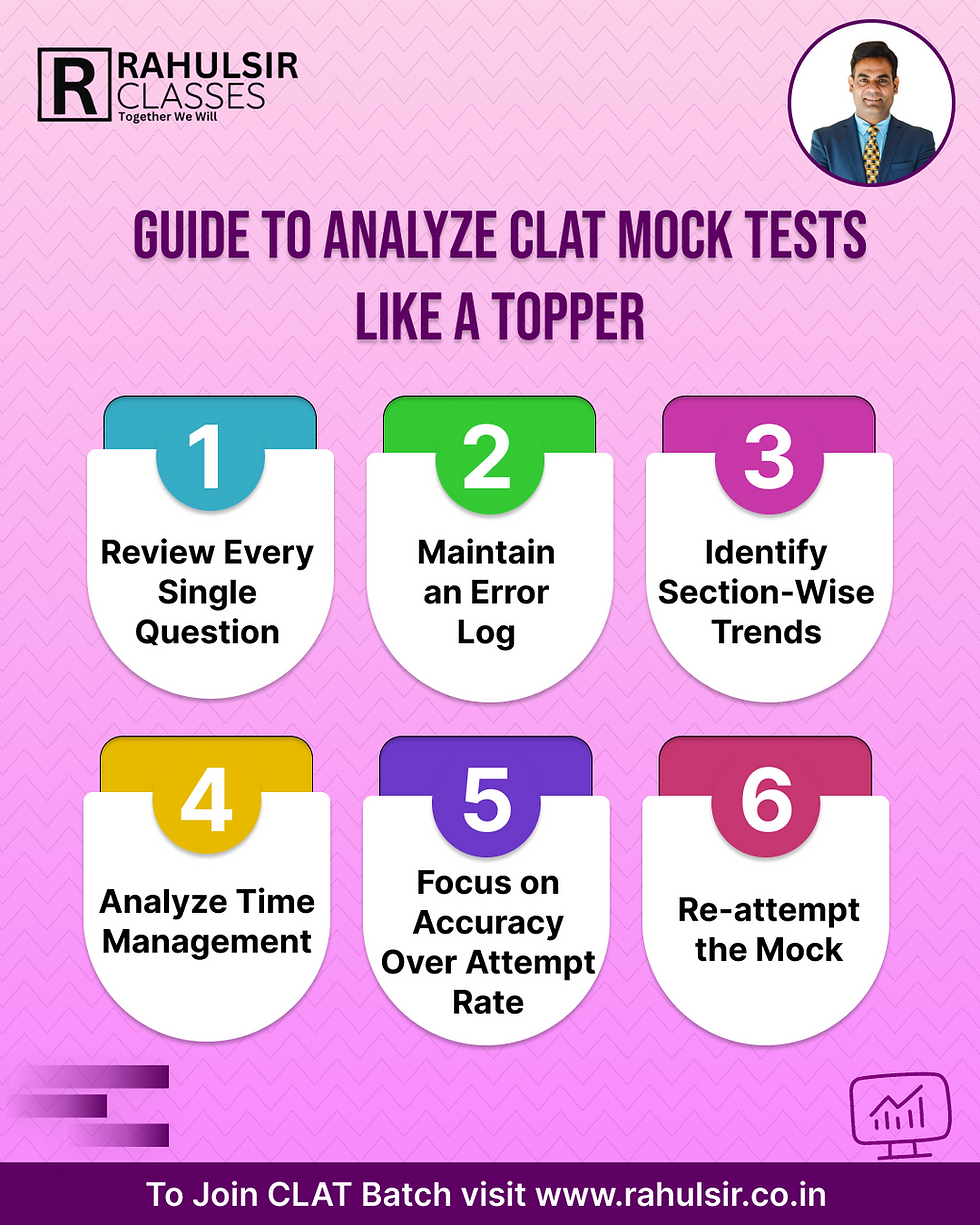How to Analyze Your CLAT Mock Tests Like a Topper
- RAHUL SINGH

- May 23, 2025
- 3 min read
If you’re preparing for CLAT 2025, taking mock tests is important — but analyzing them smartly is what separates toppers from average scorers. Most aspirants focus only on how much they scored, but toppers go beyond the score — they dig into every mistake, every guess, every time lag. In this blog by Rahul Sir Classes, we’ll show you exactly how to analyze your CLAT mock tests like a topper to maximize your performance.
Why Analyzing Mock Tests Is As Important As Taking Them
Simply solving hundreds of mocks won’t guarantee success unless you learn from them. Every mock test is a mirror that shows:
Where you stand in your preparation.
What mistakes you keep repeating.
Which sections need extra attention.
How you manage time under exam pressure.
When done right, test analysis helps you improve faster than just studying more content.
Step-by-Step Guide to Analyze CLAT Mock Tests Like a Topper
1. Review Every Single Question
After finishing the mock, go through every question — whether you got it right, wrong, or left it blank. Ask yourself:
Why did I get it right? (Knowledge or luck?)
Why did I get it wrong? (Misinterpretation, lack of concept, careless mistake?)
Why did I skip it? (Lack of time, low confidence, difficult question?)
Toppers never leave this step incomplete. They understand the root cause behind every mistake.
2. Maintain an Error Log
Create an Error Log Book where you write down:
Question Topic
Why you got it wrong
How you’ll avoid it next time
Over time, you’ll see a pattern. For example, if you keep losing marks in Reading Comprehension main idea questions, you’ll know it’s time to practice specifically for that.
3. Identify Section-Wise Trends
Analyze your performance section-wise:
English Language: Are you reading too slowly? Misunderstanding vocabulary?
Current Affairs and GK: Are you guessing too much?
Legal Reasoning: Are you applying concepts incorrectly?
Logical Reasoning: Are you rushing or misreading options?
Quantitative Techniques: Are calculation errors common?
Toppers fine-tune each section based on analysis.
4. Analyze Time Management
Check:
How much time did you spend per section?
Which section took longer than it should have?
Did you rush through some sections and lose accuracy?
Toppers maintain a perfect balance between speed and accuracy — and they get there through detailed time tracking.
5. Focus on Accuracy Over Attempt Rate
Many students focus on attempting more questions, but toppers focus on high accuracy first. During analysis:
Calculate your accuracy percentage (correct answers/total attempted × 100).
Improve your accuracy before you worry about attempting more questions.
6. Reattempt the Mock
Once you’ve analyzed everything, re-attempt the same mock without a time limit. This helps you:
Correct your mistakes.
Boost your confidence.
Deepen your conceptual clarity.
Toppers often reattempt mocks to internalize their learnings.
Common Mistakes Students Make in Test Analysis
Focusing only on overall score.
Not reviewing correct answers.
Ignoring time management flaws.
Repeating the same mistakes in the next mock.
Avoid these, and you’re already halfway to becoming a topper!
Conclusion
Analyzing your CLAT mock tests properly is not optional — it’s essential if you want to ace CLAT 2025. Learn from every error, polish every weak area, and fine-tune your strategy based on real data, not guesswork. At Rahul Sir Classes, we not only provide high-quality mock tests but also teach you how to analyze them like a topper so you can reach your dream NLU!
Want expert guidance on how to crack CLAT 2025 with the best strategies? Join Rahul Sir Classes today for full mentorship, customized mock test analysis, and topper-approved tips that guarantee results! Contact us now to begin your winning journey!
FAQ
Q1. How many mock tests should I take before CLAT?
Ans: Ideally, 40–50 full-length mocks with detailed analysis for maximum readiness.
Q2. What should be my focus during mock test analysis?
Ans: Focus on identifying mistakes, improving time management, and increasing accuracy.
Q3. Is it important to review questions I got right too?
Ans: Yes! Sometimes correct answers are guesses. Reviewing ensures you have real conceptual clarity.
Q4. How can Rahul Sir Classes help me with mock test analysis?
Ans: We offer detailed feedback, customized improvement plans, and expert mentorship after every mock.
Q5. Should I reattempt the mocks after analysis?
Ans: Absolutely. Reattempting helps reinforce concepts and avoids repeating mistakes in the real exam.




Comments